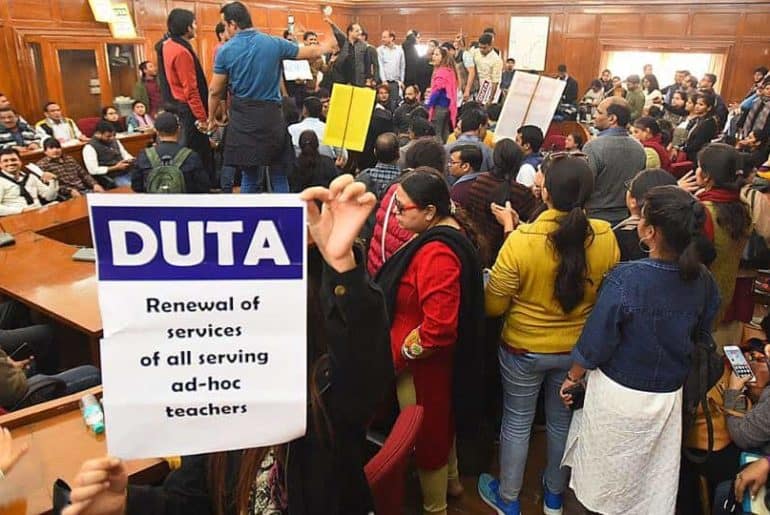Students of Ramjas College were prevented from gathering in college amphitheater for peaceful Preamble reading by the college administration.
The students of Delhi University’s Ramjas College formed a Young India Coordination Committee along with the nationwide movement by Young India. On 15th January, the committee called for a public meeting at the college amphitheater- a common space where students meet every day, as a protest against the Citizenship Amendment Act (CAA) and National Register of Citizens (NRC). However, the students were notified that no programme could be held at the institute’s amphitheater without prior permission from the administration.
“ABVP had conducted a program (in the amphitheater) on Vivekananda Jayanti just the day before. But on 14th night, the admin put up Notice saying that no gathering will be allowed. When we came to the college on 15th, we saw police forces outside the gates with lathis and guns while the non-teaching staff wasn’t letting people enter the amphitheater. ABVP had also started mobilising their goons in the college,” quoted Abhigyan, a second-year political science student at Ramjas.
The students accused the administration of attempting to disrupt their peaceful gathering and the reading of the Preamble of the Constitution while the Principal claimed it to be one of the college’s rules. The police were called to prevent any inopportune occurring. Finally, the students decided to gather at the Chemistry Lawns within the campus and peacefully march towards the amphitheater.
“200+ students raised the slogans of Azadi (freedom) right in front of the police, principal & administration, and ABVP. Everyone read out the preamble and also sang the national anthem. Nobody dared to stop us. Once the students do these, it becomes harder to label them as “anti-national”. How can you call someone who sings ‘Jana Gana Mana’, a traitor? Who will believe that a person who proudly reads the Preamble is a terrorist? The program peacefully went on with Ramjas Dramatics Society, Shunya, performing a brilliant play and the students ending it by singing various protest songs,” provided Dhathri, a third-year political science student in Ramjas.
Principal Manoj Khanna argued that the students should have sought permission from the administration at which the college would have made prior arrangements. “If any department wants to hold a function, it has to take the administration’s permission. Is it possible that anybody can come and do anything at the amphitheater? If something goes wrong, who will be responsible?” added Khanna.
The students admitted that no permission was sought. However, Dhathri also provided, “We did not think seeking permission from the clearly biased authority to read preamble and gather around in support of the constitution in our very own college was necessary. We also did not think it was appropriate to get someone’s approval to read and discuss a book (Constitution) in university spaces”.
The Principal also said, “If you want a debate on anything, there has to be both views. It should be an open debate, where each side gets a chance to convince their audience.”
“The Ramjas Principal along with police and admin staff tried to disrupt our meeting continuously. They kept saying ‘controversy ho jaayegi’ (a controversy might occur) and ‘maar peet ho sakti hai’ (a brawl may take place). The fact is that they themselves know that it is only the ABVP which inflicts violence, yet they were hell-bent on curbing our gathering, rather than stopping the goons,” further added Abhigyan.
Image Credits: Jaishree Kumar for DU Beat
Aditi Gutgutia















